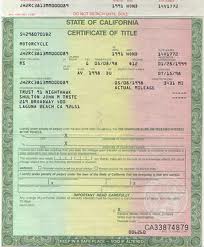It’s a Dirty Business
There is nothing clean about "title washing." The phrase as used in this context is more like laundering, as in money laundering, than cleaning up anything that has to do with your car.

The core purpose of car title is to disclose and confirm the ownership of the vehicle, but it also gives notice of other information the legislature has deemed it essential for the owner to know. This might mean whether the car or truck was formerly a lemon law buyback, whether the vehicle had been used as a prior daily rental, or whether it had been wrecked and salvaged. Thus, title is said to "branded" with disclosures of these kinds. "Title washing" refers to scrubbing out the truth about vehicle history. It can result from actually erasing evidence of prior accidents, or delaying the report of a salvage history, or even counterfeiting registration documents to hide the negative history of a car.
The result of title washing is that the next used car buyer thinks he or she is getting a bargain on a safe car, when in fact it might have been in a serious accident and only superficially repaired. If the price seems too good to be true, it probably is too good to be true.
The sale of rebuilt wrecks not only damages the buyer financially, but returns unsafe vehicles to the stream of traffic, making the roads and highways less safe for everyone. Some of theses salvaged vehicles should never be resold at any price. For example, a car that has serious frame damage puts the driver and passengers at greater risk of severe injury in the event of a second accident, even a simple rear end collision. A truck's steering system that was rusted out in undisclosed flood damage could endanger future oncoming traffic as well. A driver who does not know that a previous rental company failed to have brakes repaired pursuant to a recall could face great bodily harm to himself and others in the event of a crash.
Consumer advocates have argued for a national database of salvaged vehicles for a long time, meeting the resistance of industry and regulatory agencies at every turn. As far back as 2009, the federal Department of Justice created a National Motor Vehicle Title Information System, to protect consumers from title washing. But the data in the federal system is incomplete. Private companies like AutoCheck, CarFax and Experian have their own reporting systems, but these reports are notoriously incomplete as well. The problem is compounded when cars are shipped across state lines for resale, because different states exercise different levels of efficiency in compliance.
The concern is not a small one. You can read the full report, entitled "One Million Used Cars Are Hiding a Terrible Secret," right here.
 Kemnitzer Barron & Krieg Home
Kemnitzer Barron & Krieg Home

